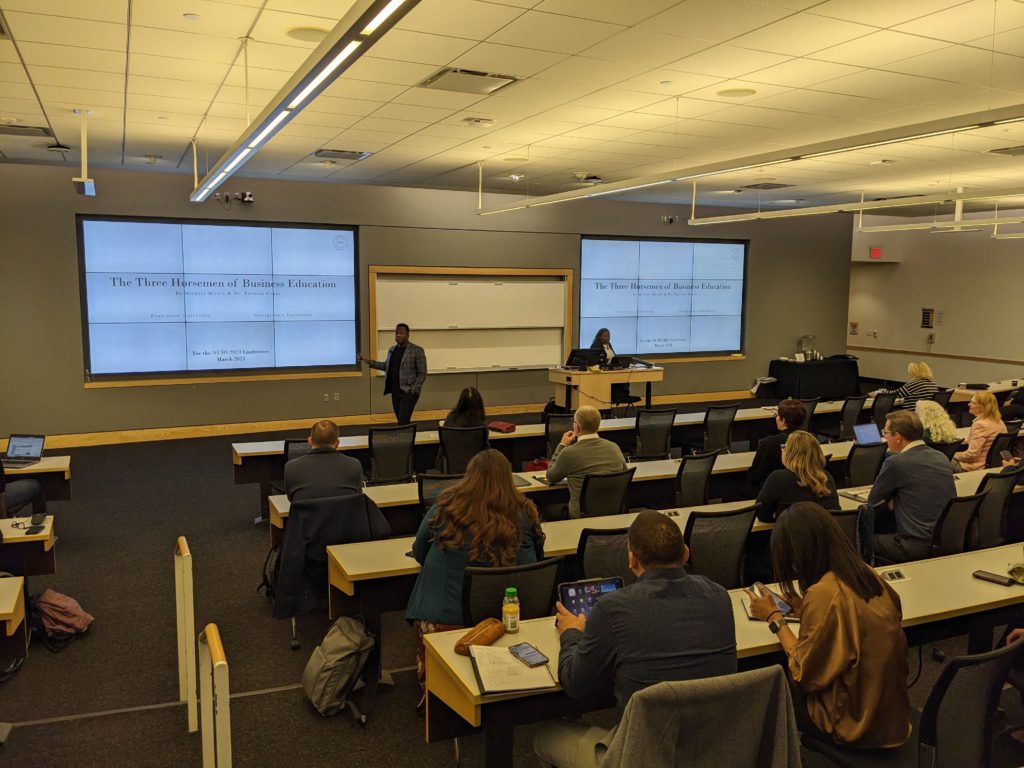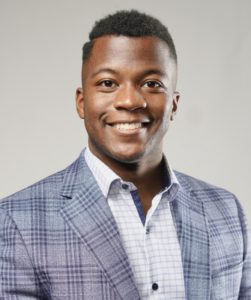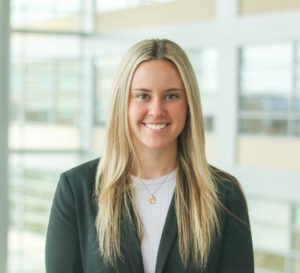
Michael Mitole and McDonough Dean Patricia Grant present a paper together at the National Undergraduate Business Symposium. Courtesy photo
Michael Mitole has long been inspired by the vision of Wendy Kopp, the founder of Teach for America, and her model for training young college graduates to be a force for good in their communities. As he moved through his time as a student at Pennsylvania State University’s Smeal College of Business, he wondered if aspects of her visionary model could be applied to the young business school student after they graduate.

Michael Mitole, co-founder and managing fellow at The Business Scholars Institute. Courtesy photo
A research grant from McKinsey & Company for his senior honors thesis allowed him to delve into pressing questions such as what is the higher purpose of business education and how undergraduate business schools create future leaders in society, he says
His lightbulb moment – and the eventual creation of The Business Scholars Institute –came when he presented the findings of his paper, along with Georgetown’s Patricia Grant, at the 2023 National Undergraduate Business Symposium at the University of Michigan’s Ross School of Business.
Recent business graduates are frequently portrayed in the media as salary-obsessed and laser-focused on their careers, rather than as leaders in their communities, he told the group of deans and senior administrators from leading undergraduate business schools in the country. His paper, backed up by various media articles criticizing business education today, generated a flurry of conversation amongst the deans. They told him they often found themselves having to convince others on campus and the larger community that business education really mattered.
“That pivotal time frame between graduating and starting your career does not need to be a leaky pipeline,” says Mitole, co-founder and managing fellow at the BSI. “What would it mean if students continued to think about their leadership capacity and value in a serious way after they graduated?”
A NEW MODEL FOR KEEPING ALUMS ENGAGED

Patricia Grant, senior associate dean of undergraduate programs at Georgetown University’s McDonough School of Business. Courtesy photo
By the time he left the conference, Mitole and Grant, senior associate dean of undergraduate programs at Georgetown University’s McDonough School of Business, had come up with the idea for The Business Scholars Institute, a group that seeks to tap and connect a new generation of recent business school undergraduates to serve as leaders in their communities.
The group’s goal is to help recent alumni with pivotal career transitions early in their careers and foster a strong community of undergraduate business school alumni in cities across the U.S., he says. BSI members can then serve as mentors to current undergraduate business school students, speak at undergraduate student clubs and provide them with a community in the city where they intern.
How to accomplish this lofty goal? Mitole and BSI co-founder Katie Cocco, another recent Smeal Graduate, are looking to create what BSI is calling “Alumni City Communities” in 16 different cities made up of recent alums from 60 of the leading undergraduate business programs in the U.S.
These communities will be the lynchpin of the organization, and will be responsible for creating a national network of young leaders who emphasize ethical thinking and want to have an innovative impact in their work and at large, says Mitole, who graduated from Smeal last spring and is now an associate consultant at Boston Consulting Group. The groups will be connected together through a national Alumni City Community board.
“In ten years, what we’d love to see is going from a world where business schools now are kind of viewed in their own silos to a cross-institutional community that is lifelong and inter-generational. That’s the impact we think we can make with this initiative,” he says.
A NEW WAY FOR B-SCHOOLS LOOK TO KEEP ALUMNI ENGAGED

Katie Cocco, co-founder of the Business Scholars Institute and a recent Smeal graduate. Courtesy photo
Georgetown’s McDonough School is providing BSI with institutional support to help get this project off the ground, says Grant. She is connecting Mitole and Cocco with students and alums from undergraduate business school programs across the country, and asking fellow business school deans and administrators to identify promising students who may be a good fit for the program.
Her fellow deans like the model because it provides undergraduate business programs with a concrete way to continue to support the growth and development of students after they graduate, she says. Business schools can play an important role in offering City Community members continued learning opportunities and workshops that will help keep their business skills fresh.
“Once they become alumni typically there is a break in that connection,” Grant says. “We hope with this initiative that the break doesn’t happen or if it does, it doesn’t happen as readily.
“This will start to create a more interconnected network of schools in service to the same mission.”
GEARING UP FOR A BUSY FALL
Mitole and Cocco are busy working to get the BSI program off the ground, and they hope to get the first group of Alumni City Communities in action next school year.
They have opened up applications for the inaugural cohort to recent graduates and rising seniors – applicants must have graduated or anticipate to graduate between 2015 and 2024 and still be in the early stages of their careers and not yet obtained middle management positions, according to BSI’s website.
The first round to apply to the communities just wrapped up (the Round 2 deadline is April 22nd) and so far Mitole says the group is “pleased to see strong interest from alumni in cities across the country.”
VIBRANT AND DIVERSE CITY COMMUNITIES
They hope to attract students from a wide variety of industries, from Fortune 500 companies to non-profits, Cocco says. They will evaluate candidates based on what they call the “Whole Person Framework,” meaning looking at them through the lens of their accomplishments as an individual, scholar, citizen and professional, Cocco says.
Each “City Community” will have its own local leadership board that will serve as a support network for new graduates who come to the city. They will plan social events and outings, coordinate potential volunteer opportunities and work with local business schools on how they can add value, she says.
Members can also take advantage of an ongoing discussion series the BSI plans to hold for its members across the country. For example, Cocco recently helped BSI coordinate its first ‘Whole Person Live Discussion Series’ on Feb. 28, which had more than 45 attendees from schools like McDonough, Wake Forest University’s School of Business and Penn State.
A SMOOTH TRANSITION FROM B-SCHOOL TO THE WORKING WORLD
This type of business school network would have been invaluable for Cocco when she moved last year from Pennsylvania to Austin, Texas to work at Dell Technologies’ Supply Chain Leadership Development Program, she says.
Cocco said she wishes she could have leaned on other young professionals like herself when she was making the challenging transition from business school to the working world, she says.
“The transition from being an undergraduate student to being a young professional is a huge one and I wish I’d had more of a community coming in here where I knew I could go ask questions and make meaningful relationships,” she says.
“I hope in five years these City Communities become so well known that interns and young graduates will know that they can go to any major city in the U.S. and find a community there waiting and ready to support them.”
DON’T MISS: Wharton Students Trek to Antarctica for Leadership Training and Making Moves At McDonough: Entrepreneurial Georgetown MBAs Get Scrappy With Startups











Questions about this article? Email us or leave a comment below.